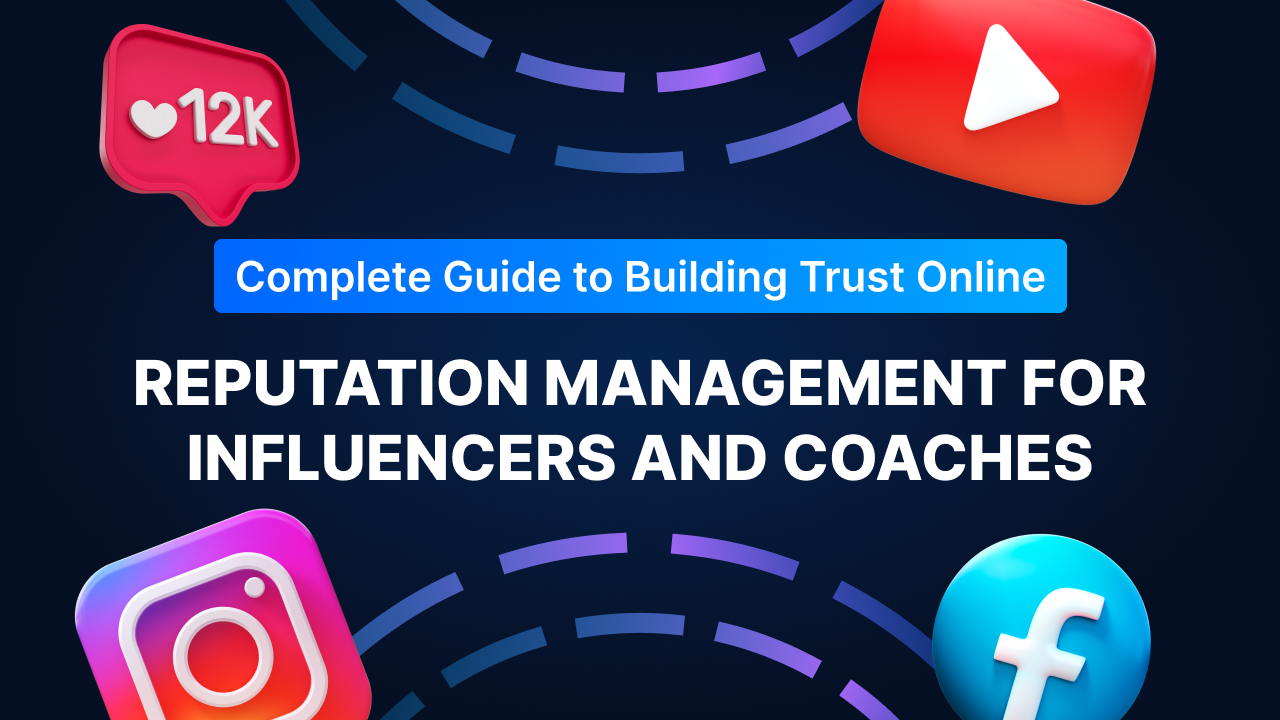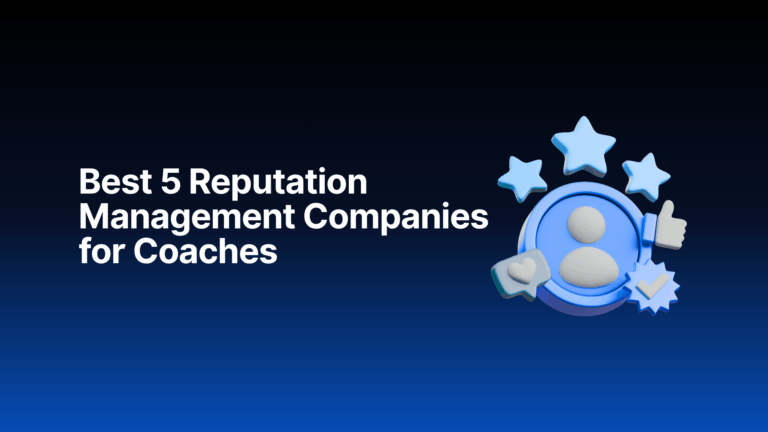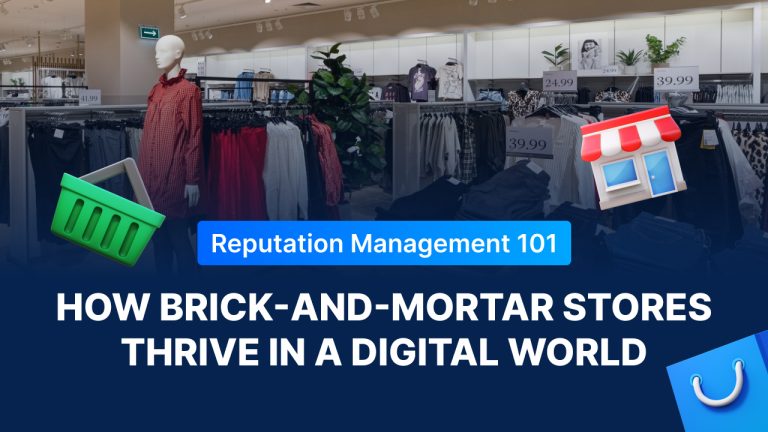Over 200 companies trust Media Removal. Get a Quote Now >
Reputation Management for Influencers and Coaches: Complete Guide to Building Trust Online

In today’s digital age, reputation management has become more critical than ever, especially for influencers and coaches whose careers are directly tied to public perception. The internet offers unprecedented opportunities to connect with audiences, but it also exposes individuals to scrutiny, criticism, and potential reputational risks.
For influencers, credibility and trust are essential to maintaining a loyal following and securing lucrative brand collaborations. For coaches, their reputation reflects the quality of their services, directly influencing client retention and new opportunities. A positive online image not only enhances trust but also plays a pivotal role in long-term growth and sustainability.
Reputation Management for Influencers and Coaches
What is Reputation Management?
Reputation management involves monitoring, managing, and improving how an individual or brand is perceived online. This process includes:
- Monitoring: Keeping track of online mentions, reviews, and comments.
- Managing: Responding to feedback, resolving issues, and controlling the narrative.
- Enhancing: Creating and promoting positive content to build a favorable image.
For influencers and coaches, reputation management is about aligning their digital presence with their personal values and professional goals. It requires an ongoing effort to maintain transparency, authenticity, and engagement with their audience.
Key Differences Between Reputation Management for Individuals and Businesses
- Individuals: Reputation management focuses on personal branding, audience trust, and relatability.
- Businesses: It revolves around corporate branding, customer loyalty, and market positioning.
Why It Matters for Influencers and Coaches
- Earning Trust from Audiences and Brands:
- Audiences are more likely to follow influencers they perceive as genuine and trustworthy.
- Brands prioritize collaborations with individuals who have a positive and professional image.
- Safeguarding Career Longevity:
- A strong reputation builds resilience against controversies and ensures relevance in an ever-changing digital landscape.
- Impact on Income Opportunities:
- Positive online reviews and strong personal branding attract partnerships, sponsorships, and loyal clients.
3. The Pillars of a Strong Digital Reputation
Credibility and Authenticity
Credibility is the foundation of any successful personal brand. It ensures that audiences and clients view you as reliable and trustworthy.
- Consistency in Messaging and Personal Branding:
Use a unified tone, style, and message across all platforms to reinforce your identity and make it easily recognizable. - Building Trust Through Genuine Content:
Share authentic stories, behind-the-scenes moments, and real-life experiences to connect with your audience on a deeper level.
Engagement and Community Building
Actively engaging with your followers or clients helps them feel connected and builds trust.
- The Importance of Open and Two-Way Conversations
Reply to comments, participate in discussions, and address questions or concerns from your audience to show that you value their input. - Strategies to Engage Meaningfully with Audiences:
- Conduct live Q&A sessions or webinars.
- Encourage followers to share testimonials and success stories.
- Share user-generated content to make your audience feel appreciated.
Transparency and Ethical Practices
Honesty and transparency are vital for maintaining long-term trust and credibility.
- Disclosing Partnerships and Staying Honest in Reviews:
Always inform your audience about paid collaborations or affiliate links. Provide unbiased opinions to maintain integrity. - How Ethical Practices Enhance Trust and Loyalty:
By adhering to ethical standards, influencers and coaches demonstrate professionalism, which strengthens their relationship with followers and clients. Transparency in addressing mistakes and clarifying misunderstandings builds confidence and fosters loyalty.
4. Steps to Build and Sustain a Positive Online Reputation
Step 1: Audit Your Current Digital Presence
Before making any changes, it’s essential to evaluate where your online reputation stands.
- Tools for Monitoring Mentions and Sentiment Analysis:
Use platforms like Google Alerts, Brand24, and Mention to track mentions of your name or brand across the internet. These tools provide real-time notifications, enabling you to monitor and address feedback promptly. - Conduct a Content Review:
Review all your existing online content from social media posts, blog articles, and videos. Remove anything that might be outdated, misaligned with your current values, or harmful to your brand image. For example:- If possible Delete old posts with controversial statements. (if its in your control)
- Update blogs or videos to reflect accurate and relevant information.
Step 2: Define Your Personal Brand
Your personal brand is the cornerstone of your reputation. It should clearly reflect your values, expertise, and mission.
- Aligning Brand Values with Audience Expectations:
Understand your target audience and tailor your messaging to meet their interests and needs. For instance, if you’re a coach, your audience may value actionable advice and empathetic communication. - Creating a Compelling Narrative:
Develop a story that showcases your expertise, journey, and unique selling points. Share how your experiences make you relatable and qualified to address your audience’s pain points.
Step 3: Create High-Quality, Shareable Content
Your content is a powerful tool to shape how you’re perceived.
- Balancing Educational, Entertaining, and Promotional Content:
- Educational: Share insights and tips related to your niche.
- Entertaining: Use humor or storytelling to engage your audience.
- Promotional: Highlight your services or collaborations subtly within valuable content.
- Leveraging Video, Blogs, and Social Media Posts:
Use diverse formats to keep your audience engaged. For instance:- Videos for tutorials or Q&A sessions.
- Blogs to establish authority in your niche.
- Social media for quick updates and community engagement.
Step 4: Respond to Feedback Professionally
How you handle feedback speaks volumes about your character and professionalism.
- Handling Criticism with Grace:
Respond politely and acknowledge valid concerns. For example:- “Thank you for your feedback. I’ll look into this and ensure it’s addressed.”
- Turning Negatives into Positives:
Constructive responses can transform criticism into an opportunity to demonstrate accountability and care. - Examples of Effective Strategies:
- Respond publicly to show transparency, then offer to continue the conversation privately.
- Acknowledge your mistakes, propose solutions, and thank the reviewer for bringing the issue to light.
Step 5: Collaborate Strategically
Collaborations with reputable brands can significantly enhance your credibility.
- Partnering with Reputable Brands:
Choose brands that align with your values and audience expectations. For example, a fitness influencer could collaborate with eco-friendly athletic wear companies. - Case Studies of Successful Collaborations:
Highlight past partnerships where both parties benefited, such as increased engagement, mutual growth, or audience trust.
Step 6: Use SEO for Reputation Building
Search Engine Optimization (SEO) ensures that positive content about you ranks higher on search engines.
- Importance of Ranking for Your Name and Keywords:
When potential followers or clients search for you, the first results should showcase your best content. - Basic SEO Strategies:
- Use your name and niche keywords in blog titles, meta descriptions, and headers.
- Build backlinks from reputable websites to boost your content’s authority.
- Maintain a professional website optimized for speed and mobile usability.
Ready to Strengthen Your Online Reputation?
Discover how Media Removal can help you build trust and credibility online.
5. Advanced Reputation Management Strategies
Proactive Crisis Management
A proactive approach to potential crises can save your reputation from long-term damage.
- Identifying Potential Risks:
Audit past actions or statements that could resurface negatively. Monitor emerging trends in your niche to stay prepared. - Creating a Crisis Response Plan:
Have a framework for addressing controversies, including designated spokespersons, clear messaging, and platforms for issuing statements. - Examples of Successful Crisis Navigation:
- An influencer who quickly apologized for an insensitive post and explained their intent, thereby avoiding prolonged backlash.
Social Proof and Testimonials
Social proof reinforces your credibility through positive audience experiences.
- Encouraging Testimonials from Clients and Followers:
Request testimonials from satisfied clients or followers who benefited from your guidance or content. - Showcasing Success Stories:
Share user-generated content or case studies that highlight the positive impact of your work.
Building a Digital Ecosystem
Having a consistent online presence across all your platforms helps maintain a strong and reliable reputation.
- Maintaining Consistency Across Platforms:
Ensure that your tone, visuals, and messaging align across your website, social media, and blogs. - How Omnichannel Marketing Supports Reputation Goals:
Cross-promote content on different platforms to engage diverse audiences. For instance:- Post a blog summary on Instagram and redirect followers to your website for the full article.
AI and Tools for Reputation Management
Advanced tools can streamline reputation management efforts.
- Overview of Tools:
- Birdeye: Centralizes reviews and allows for real-time responses.
- Brand24: Tracks mentions and analyzes online sentiment.
- Google Alerts: Notifies you of any new mentions of your name or brand.
- Using Automation:
Automate tasks like monitoring mentions, scheduling posts, and responding to reviews using AI-based tools.
6. Challenges Influencers and Coaches Face in Reputation Management
Dealing with Negative Feedback
Not all feedback is constructive, but addressing it thoughtfully is crucial.
- Trolls vs. Constructive Criticism:
- Trolls: Ignore or block them to avoid unnecessary drama.
- Constructive Criticism: Respond professionally and address valid concerns.
- Balancing Mental Well-Being:
Limit time spent reading negative comments and seek support from peers or mental health professionals.
Navigating Cancel Culture
Cancel culture can be devastating, but recovery is possible with the right steps.
- Preparing for Backlash:
Be mindful of the potential impact of your actions and words. Regularly review your content to avoid missteps. - Rebuilding Trust Post-Controversy:
Apologize sincerely, outline actionable steps for improvement, and demonstrate accountability through your actions.
Staying Relevant in a Fast-Paced Digital Landscape
The digital world evolves rapidly, and staying relevant requires adaptability.
- Adapting to Trends Without Losing Authenticity:
Participate in trends that align with your values but avoid forcing relevance. - Continuous Learning and Innovation:
Keep up with platform updates, algorithm changes, and audience preferences to maintain your competitive edge.
7. Real-Life Success Stories
Examples of Influencers and Coaches Who Overcame Reputation Crises
- Influencer Handling a Controversy Head-On
A popular beauty influencer faced backlash after an old tweet surfaced, sparking criticism from followers. Instead of ignoring it, they issued a public apology, explaining the context and their growth since the incident. They followed up by donating to relevant charities and engaging in conversations about the issue. The influencer’s transparency and proactive steps turned the controversy into a demonstration of accountability, rebuilding trust with their audience. (new post: check & tweet) - Coach Rebuilding After Negative Client Feedback
A life coach received a highly publicized negative review from a client who felt dissatisfied with their coaching program. The coach responded respectfully, acknowledged the client’s perspective, and outlined the steps they were taking to improve. They also invited the client to a follow-up session at no charge to address concerns. This response showcased the coach’s professionalism and commitment to growth, leading to an influx of positive testimonials from other clients.
Case Studies of ORM Leading to Career Growth
- Fitness Influencer Rising from Negative Press
After being accused of promoting unrealistic body standards, a fitness influencer revamped their content strategy to focus on body positivity and inclusivity. They collaborated with wellness brands that shared these values and began creating educational content on healthy lifestyle habits. Over time, this shift not only repaired their reputation but also expanded their audience and attracted new brand partnerships. - Motivational Speaker Building Trust Through Transparency
A motivational speaker with a history of controversial statements faced declining event bookings. By investing in reputation management services, they improved their online image with thoughtful content and consistent messaging. They published a series of reflective posts addressing their past and shared how they had grown. As a result, their audience engagement and booking inquiries significantly increased.
8. Actionable Tips for Influencers and Coaches
- Regularly Audit and Update Your Online Presence
- Review your profiles, website, and past content for outdated or harmful material.
- Use tools like Google Alerts to monitor new mentions of your name.
- Ensure your bio, contact details, and links are up to date.
- Engage Authentically with Followers
- Host live Q&A sessions or polls to encourage direct interaction.
- Respond to comments and messages in a genuine and personal tone.
- Share behind-the-scenes content to build trust and relatability.
- Be Transparent About Affiliations and Partnerships
- Disclose sponsored posts and affiliate links to maintain audience trust.
- Provide honest reviews of products or services, even when paid to promote them.
- Explain your decision-making process for collaborations to align with your values.
- Invest in Professional Reputation Management Services
- Hire experts for SEO, social media audits, and content creation.
- Use tools like Brand24 or Birdeye to manage reviews and monitor sentiment.
- Seek legal advice or professional help to handle harmful content or defamation.
9. Conclusion
Reputation management is not just an add-on but a core aspect of being an influencer or coach. Your online image directly affects how your audience and potential clients perceive you, which in turn influences your credibility, partnerships, and income opportunities.
The long-term benefits of maintaining a positive online reputation include building trust, enhancing credibility, and ensuring career sustainability. A well-managed reputation allows you to navigate challenges with confidence, secure meaningful collaborations, and establish yourself as a trusted authority in your niche.
Now is the time to take charge of your digital presence. Start by auditing your current reputation, engaging authentically with your audience, and crafting a compelling personal brand. Whether you’re responding to feedback or creating high-quality content, every step contributes to your lasting success.
10. Frequently Asked Questions
What is reputation management for influencers?
Reputation management for influencers involves monitoring, managing, and improving how they are perceived online. This includes responding to feedback, addressing controversies, and promoting positive content to maintain trust and credibility with followers.
Why is reputation management important for coaches?
For coaches, reputation management is essential to building trust and attracting clients. A positive reputation signals professionalism, expertise, and reliability, making clients more likely to invest in their services.
How can influencers handle negative feedback effectively?
Influencers should respond professionally and constructively to negative feedback. Acknowledge valid concerns, offer solutions, and avoid emotional reactions. This approach demonstrates accountability and builds trust with their audience.
What are the best tools for monitoring online reputation?
Some of the best tools for monitoring reputation include:
- Google Alerts: Tracks mentions of your name or brand online.
- Brand24: Provides real-time sentiment analysis and insights.
- Birdeye: Helps manage reviews and online presence effectively.
- Hootsuite: Monitors social media activity and audience engagement.
What happens if you are an influencer and have negative reviews?
Negative reviews can impact trust, reduce brand collaborations, and harm your audience engagement. However, professionally addressing valid concerns and providing solutions can help rebuild your credibility. Ignoring negative reviews can allow them to dominate the narrative, so it’s essential to tackle them proactively.
Should you fully optimize your social media platforms?
Yes, keeping your social media profiles updated and optimized ensures a consistent and professional online presence. This includes:
- Optimizing YouTube Titles and Captions: Write concise, engaging titles and include keywords that match search intent. Captions should summarize the content and add value to the viewer’s experience.
- Using Keywords and Phrases for TikTok, Instagram, and YouTube Content: Research trending keywords and hashtags relevant to your niche. Incorporate them naturally in captions, descriptions, and tags for better discoverability.
As a coach, should you reply to negative reviews?
Yes, responding to negative reviews shows transparency and professionalism. However, each situation requires careful consideration:
- For Transparency and Providing Facts: Clarify any misunderstandings and provide context to the reviewer.
- Understand Not Everyone Will Appreciate Your Response: Some reviewers may remain dissatisfied despite your efforts.
- Assess Each Situation and Respond Accordingly: Prioritize genuine concerns and avoid engaging with baseless criticism.
How should you boost your positive online presence?
- Create High-Quality Content: Regularly post valuable, engaging content tailored to your audience.
- Encourage Positive Reviews: Ask satisfied clients or followers to share their experiences.
- Engage Authentically: Respond to comments, participate in discussions, and show appreciation for your audience’s support.
Collaborate with Reputable Brands: Partnering with credible entities enhances your credibility and expands your reach.



